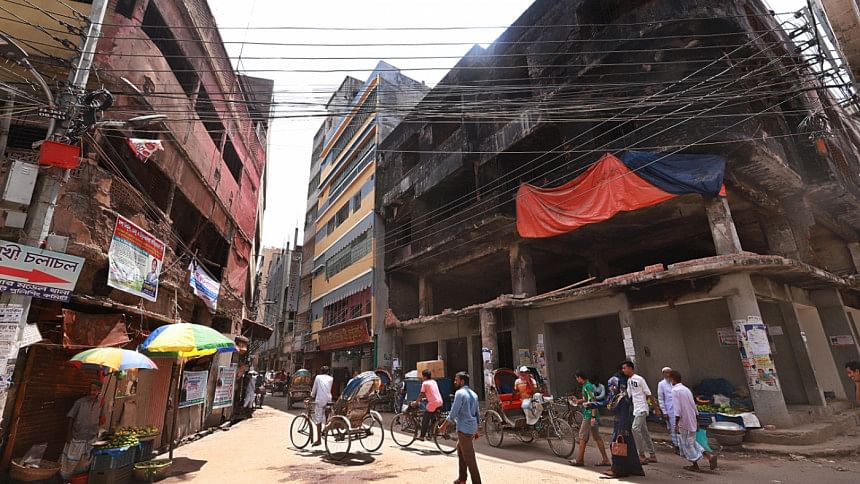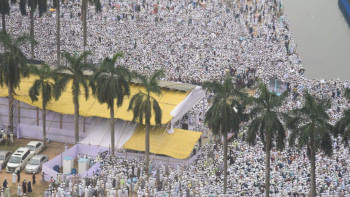No lesson learnt

It seems the lessons have not learnt been yet. Six months have passed since the devastating Chawkbazar fire, and Old Dhaka is still sitting on a ticking time bomb as chemical warehouses continue to operate -- mostly in residential buildings -- due to lack of action by the authorities concerned.
What’s more frustrating is that families of the victims who lost their lives in the chemical blaze, have not received any financial assistance till date, despite promises made by authorities.
Once a crowded place, Chawkbazar’s Churihatta has become quiet, as the fire changed the landscape of the neighbourhood with Haji Wahed Mansion [from where the fire started] still being considered hazardous. Locals fear it may collapse anytime.
A three-storeyed building, opposite to Haji Wahed Mansion, was also damaged in the incident, .
Out of around 30 businesses ravaged by the fire, only five could restart operations. One of them is Rajmohol Restaurant, situated in a building adjacent to Wahed Mansion.
“We opened two months after the fire. But business here is not good as before. People are still fearful,” Asif Uddin, manager of the restaurant, told these correspondents during a visit to the spot on Sunday.
At least 70 people were killed in the fire on February 20, while many were injured. Several business establishments were gutted, with everything turning to ashes.
Locals said the owners of Wahed Mansion -- siblings Hasan and Sohel, who are now in prison -- can’t avoid their responsibility.
“Greedy house owners like them didn’t learn any lesson from the Nimtoli tragedy. They mindlessly rented out floors and rooms for storing chemicals and flammable products, just for money,” he said.
“Hundreds such warehouses are still dotting the area but authorities seem to have turned a blind eye,” said Ashraf Uddin Shadhin, president of Churihatta Ekota Sangha, a local voluntary club.
The warehouses store flammable substances, potent enough to cause disasters similar to the ones that devastated Chawkbazar and Nimtoli, they said, referring to the latest fire that broke out on August 14 at a plastic factory in Postar Dhal area of Islambagh.
Locals said they want to help the authorities identify the warehouses in residential buildings. They, however, alleged that the authorities are not cooperative.
After the fire at Wahed Mansion, its owners along with some others tried to establish that the fire originated from gas cylinders or transformer blast, they said.
“But CCTV footage dispelled that propaganda. It was chemicals, stored in Wahed Mansion, that caused the massive explosion,” Ashraf said.
He added that the owners threatened owners of adjacent buildings for providing the footage. Later, he filed a general diary in this connection.
Wahed Mansion owner’s family wanted to reopen the building and started reconstruction some months back, but facing locals’ protests they stopped the work, he said.
Now, the building remains locked.
Residents of old town say more than 500 chemical warehouses, factories and outlets are still being run in the overpopulated residential areas, although Dhaka South City Corporation (DSCC) has stopped providing new licences as well as renewal of old ones since last year.
The chemical warehouses and stores are mostly located in Mitford, Armanitola, Kayettuli, Agamasi Lane, Islambagh, Bongshal, Shaheednagar, Chawkbazar, Imamganj and Babubazar areas.
Refuting the allegations, Arif Hossain Masud, general secretary of Bangladesh Chemical and Perfumery Merchant Association based in Old Dhaka, said the flammable chemicals which were restricted by the department of explosives, are not stored in the city anymore.
“With permission from the department of explosives, the chemicals are stored outside Dhaka. I’m not aware whether someone has kept it hidden inside their house,” Arif said.
Asked about highly flammable products like body spray and cigarette lighter, he said, “Those are flammable but imported items. We will not take the responsibility if someone imports them personally.”
DSCC Chief Executive Officer Mostafizur Rahman said they had several meetings with concerned merchant bodies after the Chawkbazar incident.
“We conducted drives. The chemical traders all agreed to relocate their warehouses. Now it’s under process,” he added.
After a fire had claimed 124 lives in Old Dhaka’s Nimtoli in 2010, the government decided to shift chemical warehouses from residential areas to industrial zones in Keraniganj or Kamrangir Char. But the initiative did not see much progress.
The government has now decided to shift chemical warehouses of Old Dhaka to Kathaldia in Gazipur’s Tongi temporarily, as the long-term plan to set up a permanent hub will take time. The permanent project will be set up in Munshiganj.
Some of the storehouses in old town are set up in hard-to-reach rooms and buildings, meaning these are inaccessible to firefighters.
Most of the warehouses store chemicals and dyes, largely used in ready-made garment (RMG) and textile factories. Old Dhaka is also known as a hub for counterfeit perfume products. Numerous warehouses have been set up to store these. Some buildings have small rubber factories while some have plastic. In some buildings, traders have set up shoe factories.
Last year, Old Dhaka saw at least one fire incident a day on average, with 468 fire incidents in Lalbagh, Hazaribagh, Sadarghat and Siddique Bazar.
NO FINANCIAL ASSISTANCE FOR VICTIM FAMILIES
Nasir Uddin’s son Wasi Uddin Mahid, 22, is one of the victims killed in the deadly blaze. Talking to The Daily Star on Sunday, he said they have not received any help yet.
Nasir, in his 60s, cannot work any more, and Mahid was supporting the family.
“He used to earn 10-12 thousand taka per month and contributed to the family expenses,” Nasir said, adding that he has taken loan to meet the family’s needs.
Abdul Mannan, who had a grocery shop opposite to Wahed Mansion, said the fire engulfed his shop within moments and he could save nothing. Recently, Mannan reopened his shop.
“I haven’t received any financial aid so far. I had to take a Tk 5 lakh loan to restart my business,” Mannan said, expressing frustration.
Hundreds of Chawkbazar residents, under the banner of Churihatta Ekota Sangha, organised a human chain in front of the National Press Club on April 5 -- demanding compensation for the fire victims.
However, the victim families are still in the dark regarding whether they would get any compensation.


 For all latest news, follow The Daily Star's Google News channel.
For all latest news, follow The Daily Star's Google News channel. 



Comments